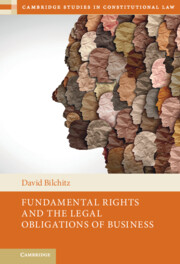Book contents
- Fundamental Rights and the Legal Obligations of Business
- Cambridge Studies in Constitutional Law
- Fundamental Rights and the Legal Obligations of Business
- Copyright page
- Dedication
- Contents
- Figures
- Tables
- Preface
- Acknowledgements
- Table of Cases
- Introduction The Question of Substantive Corporate Obligations for Fundamental Rights
- 1 The Nature and Purpose of the Corporation in Law
- Part I Legal Doctrinal Models for Addressing the Substantive Obligations of Non-State Actors for Fundamental Rights
- Part II Towards a Multi-Factoral Approach for Determining the Substantive Content of Corporate Obligations
- Part III The Institutional Implications of the Multi-Factoral Approach
- Bibliography
- Index
1 - The Nature and Purpose of the Corporation in Law
Published online by Cambridge University Press: 29 October 2021
- Fundamental Rights and the Legal Obligations of Business
- Cambridge Studies in Constitutional Law
- Fundamental Rights and the Legal Obligations of Business
- Copyright page
- Dedication
- Contents
- Figures
- Tables
- Preface
- Acknowledgements
- Table of Cases
- Introduction The Question of Substantive Corporate Obligations for Fundamental Rights
- 1 The Nature and Purpose of the Corporation in Law
- Part I Legal Doctrinal Models for Addressing the Substantive Obligations of Non-State Actors for Fundamental Rights
- Part II Towards a Multi-Factoral Approach for Determining the Substantive Content of Corporate Obligations
- Part III The Institutional Implications of the Multi-Factoral Approach
- Bibliography
- Index
Summary
This chapter is concerned with understanding the limited liability corporation, the dominant form of conducting business today. First, I consider the relationship between the corporation and the individuals underlying it and argue that this is best captured by a ‘supervenience relation’: the corporation is not reducible to but dependent upon the individuals underlying it. Secondly, I consider the very purpose of forming a corporate entity and argue for a ‘socio-liberal conception of the corporation’. This view understands the corporation as a structure designed to harness the expression of individual economic interests for social benefits. Both the wider social purpose and individual profit-seeking motives are necessary to understand the complex duality that is the modern corporation. These reflections on the nature and purpose of the corporate form – as will be seen later in this book - are of vital importance to explicating the obligations such entities have that flow from fundamental rights.
Keywords
- Type
- Chapter
- Information
- Fundamental Rights and the Legal Obligations of Business , pp. 21 - 56Publisher: Cambridge University PressPrint publication year: 2021

